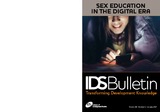Sex Education in the Digital Era
| dc.contributor.author | Oosterhoff, Pauline | |
| dc.contributor.author | Müller, Catherine | |
| dc.contributor.author | Shephard, Kelly | |
| dc.date.accessioned | 2017-02-09T10:26:22Z | |
| dc.date.available | 2017-02-09T10:26:22Z | |
| dc.date.issued | 2017-02-08 | |
| dc.identifier.uri | https://opendocs.ids.ac.uk/opendocs/handle/20.500.12413/12818 | |
| dc.description.abstract | Exploring sex and sexual relationships is an important part of adolescence, and therefore sex education should have a central role in adolescent emotional development as well as dealing with crucial public-health issues. Good sex education reduces maternal and child mortality by helping to prevent unwanted, early and risky pregnancies and sexually transmitted diseases, yet in many parts of the world unmarried teenagers are excluded from receiving information and sexual health services because – according to unrealistic and conservative religious and socio-cultural norms – they are not supposed to be sexually active. Much of the research on sexuality in the digital era is moralistic and slanted, so for those working on sexual/reproductive health and youth/digital development issues, learning more about the subject is a major challenge. There has never been a collection of scholarly work on this topic for a mixed audience of researchers, policymakers and practitioners until this issue of the IDS Bulletin. A collaboration between Love Matters and IDS, articles discuss experiences with digital sex education in many countries and in a range of settings. The issues confronted are diverse, yet the common themes encountered are often as striking as the differences. Young people need help in critically examining the sexual messages they receive, as well as access to new types of digital sex education environments that are realistic, emotionally attuned, non-judgemental and open to the messages they themselves create. Contributions in this IDS Bulletin suggest an urgency for academics and practitioners to understand and develop digital literacy skills in order to help build such environments. | en |
| dc.language.iso | en | en |
| dc.publisher | Institute of Development Studies | en |
| dc.relation.ispartofseries | IDS Bulletin;48.1 | |
| dc.rights | © 2017 The Authors. IDS Bulletin © Institute of Development Studies | DOI: 10.19088/1968-2017.102 This is an Open Access article distributed under the terms of the Creative Commons Attribution 4.0 International licence, which permits unrestricted use, distribution, and reproduction in any medium, provided the original authors and source are credited. http://creativecommons.org/licenses/by/4.0/legalcode | en |
| dc.rights.uri | http://creativecommons.org/licenses/by/4.0/ | en |
| dc.subject | Sexuality and Development | en |
| dc.title | Sex Education in the Digital Era | en |
| dc.type | Series paper (IDS) | en |
| dc.rights.holder | Institute of Development Studies | en |
| dc.identifier.team | Gender and Sexuality | en |
| dc.identifier.doi | 10.190881968-2017.100 | |
| rioxxterms.funder | Default funder | en |
| rioxxterms.identifier.project | Default project | en |
| rioxxterms.version | VoR | en |
| rioxxterms.funder.project | c941507f-fd0b-4fc3-9822-4b2132f61a1d | en |
Files in this item
This item appears in the following Collection(s)
Except where otherwise noted, this item's license is described as © 2017 The Authors. IDS Bulletin © Institute of Development Studies | DOI: 10.19088/1968-2017.102
This is an Open Access article distributed under the terms of the Creative Commons Attribution 4.0 International licence, which permits unrestricted use, distribution, and reproduction in any medium, provided the original authors and source are credited. http://creativecommons.org/licenses/by/4.0/legalcode


